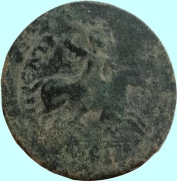|
||||||||||||
| AE32, Macedonian Peltae,
Mamaea, emperor on horseback |
||||||||||||
|
23.7.2020
..from
Ancient Roman coins.Hi, id pls. 20.2g. |
||||||||||||
|
||||||||||||
|
Rome, 25.7.2020
Dear,significant elements concerning the coin above are summarized below: AE321,
Peltae in Phrygia2, 222-235
A.D.,
RPC VI 5644 (temporary), BMC XXV
30 var. (page 351) Short summary (worn or
illegible parts of the legend are
indicated in red): A search on the web for coins of the type of figure gave rise to the following results:
Best regards. ---------------------------------- (1) AE32. I collect in the table below the physical characteristics of the coins above:
(2) Peltae, a Macedonian colony, identifiable with the ruins near ăivril in today's Turkey (see map), is an ancient episcopal seat of the Roman province of Phrygia Pacatiana in the civil diocese of Asia.. It was part of the patriarchate of Constantinople and was suffragan, that is part of its capital Laodicea in Phrygia's metropolitan Archbishopric. The diocese is documented in "Notitiae Episcopatuum" of the patriarchate of Constantinople up to the twelfth century. Mint site during imperial age from Antoninus Pius to Volusianus. From Septimius Severus onwards, the coins usually bear the name of the first municipal magistrate (v. BMC XXV, pag. lxxxvii). (3) IOVΛIA - ΜΑΜƐΑ ϹƐ, which can be expanded into IOVΛIA - ΜΑΜƐΑ ϹƐβαστιάς, equivalent to Latin "IVLIA MAMAEA AVGusta". Marcus Aurelius Severus Alexander, originally called Alexianus, was born around 208 A.D., son of Julia Mamaea and of Gesius Marcianus. In 221 Severus Alexander, under pressure from his grandmother Julia Maesa, was adopted by his cousin Emperor Elagabalus, who gave him the title of Caesar. After Elagabalus'death (early 222), Alexander was immediately recognized as emperor by the Praetorian guards and confirmed by the Senate the following day. Alexander led the empire intelligently and well, and the state conditions improved, but the emperor was too influenced by his mother (the coin under consideration, struck in the name of his mother, is an example of the mother's influence), and this was felt by the troops. For the first nine years the empire was not troubled by wars, but in 232 Severus Alexander had to fight the Sasanian Ardashir who had recently ousted the Arsacid kingdom in Parthia and who was now threatening Syria and Cappadocia. The campaign met only a partial success and Alexander had to go back soon to West, where riots on the Germanic borders required his presence. Anyway, before the battle began, the soldiers proclaimed Maximinus, one of their commanders, as emperor and killed Severus Alexander and Julia Mamaea in their camp near Mainz on 22 March 235 A.D. (4) Π-ƐΛΤΗΝⲰΝ ΜΑΚ ΑΡ - ΦΑΥϹΤƐΙΝΟΥ. Expanding the legend we get "ΠƐΛΤΗΝⲰΝ ΜΑΚεδˇνων ΑΡχοντος - ΦΑΥϹΤƐΙΝΟΥ", ethnic genitive which means "[coin struck in the name] of the Archon of the Macedonian Peltae, Phaustinos" who held the position of Archon (supreme local magistrate) at the time of Severus Alexander in 222-235 A.D. A coin with the same reverse (except that the horse moves back) was also beaten in the name of Severus Alexander (see link2). (5) O V. No explanation was found for these two letters. |
||||||||||||
|
||||||||||||

